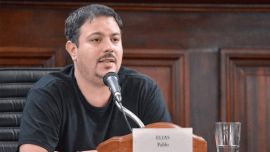When Mauricio Macri hands over the presidency to Alberto Fernández on December 10, some have speculated the outgoing leader will be returning the true reins to his predecessor and the vice president-elect, Cristina Fernández de Kirchner.
The backdrop of uncertainty around how power will be shared between Argentina’s two top executives has shrouded the ticket since the earliest stages of the campaign, intriguing analysts throughout the transition process. And with a united Peronist front full of competing factions backing Fernández, that’s plenty of people to keep happy.
According to Lucas Romero, the director of political consultancy firm Synopsis, the broad-based coalition of the otherwise distinct Peronist groups was crucial to Frente de Todos’ success in October. That unity, he said, would not have been possible without Fernández de Kirchner’s “key” decision to drop her own candidacy and back her former Cabinet chief.
The former president’s choice wasn’t a selfless one, though, according to Romero. It provided Fernández de Kirchner with electoral “compensation” in exchange.
“He [Fernández] didn’t necessarily have a tremendous amount of his own power, but he had a support structure from governors in the interior of the country, an affinity for different sectors [...] and a history of working backstage to create political consensus,” Romero said.
The strategic partnership quickly morphed into a powerful engine for the Peronist coalition’s campaign, one that was heavy on rhetoric and broad ideas but light on policy specifics, inclusive of how much influence the former president would have on governance.
Fernández and Fernández de Kirchner have both stated publicly that the “sharing of power” was an important part of their victory, and that they plan to continue “like this, without any tensions.”
Meanwhile, some media reports have pointed to the dearth of specificity around party leadership nods or formal Cabinet appointments until Friday’s announcement as evidence that the two are leading in tandem – and that they have been unable to reach agreements. Such points would be buttressed by the hypothesis that the presidentelect’s reticence to announce anything before his running-mate returned from her most recent trip to Cuba and the two could meet face-to-face signals a clear inability to lead independently.
Others have suggested the duo’s “power pact” or “dual mandate” is destined to fail once the emotions of victory subside, replaced by the realities of governing.
“It’s very difficult to predict if there will be a conflict of power because of all the different information that’s coming out in themedia. It complicates making an objective political analysis,” said Ricardo Rouvier, a political analyst and consultant.
Though certainty will be elusive until the start of the new administration, analysts still believe there are some key points to focus on when considering how – and if – Fernández and Fernández de Kirchner will effectively share power.
POLITICAL UTILITARIANISM
“The only way there’d be a power struggle between the two is if we assume that they’re both ignorant politicians,” said María Esperanza Casullo, an investigative professor at the National University of Río Negro. “The reality is that neither can have success without the other.”
Much like the campaign itself, the transition process has had a strong emphasis on ideas and ideals but a lack of concrete plans delivered to the public on how to execute. What did emerge, though, were regular tales of exchanging positions for previous political support.
“The cabinets of Peronist presidents have always been made up of members of an informal coalition — people that represent the governors, the unions, social movements and, after 2003, Kirchnerismo,” said Casullo. “The president ‘pays’ whoever supported him in the campaign and also puts people of his own. Presidents prior have done the same thing and Fernández is no exception.”
While Peronism has historically cast a wide electoral net, this year’s coalition was especially broad, as noted by this election’s results showing the largest concentration of votes in the two major voting blocs in Argentina’s history. Therefore, according to reporting from Perfil, negotiations around who will make up the Cabinet have been especially difficult, even described as “frenetic.” Fernández discussed appointments with Fernández de Kirchner, but also with those who allied with him during the campaign and helped him achieve the sweeping coalition that ultimately won him the election.
A source from Fernández’s future Cabinet confirmed to Perfil last week that the vice-president had indeed had a sizeable influence on the make-up of the incoming government, but that this wasn’t surprising.
“It’s a partnership, and it’s good that spaces are divided up,” the individual told the newspaper. “They all want spaces and she – who contributed the most votes – shouldn’t have her own?”
Enrique Zuleta Puceiro, a law professor at the University of Buenos Aires and president of consulting firm OPSM, said the sheer size of the coalition — which he described as encompassing at least 12 parties and around 20 social organisations — requires a centre of gravity. That anchor is Fernández de Kirchner, but Zuleta Puceiro doesn’t “foresee any immediate major risks” that would jeopardise the coalition’s basic understanding of the Fernández and Fernández de Kirchner candidacy.
GOVERNANCE
In her new role as vice-president, Fernández de Kirchner assumes the role of head of Argentina’s Senate. It gives her the right to cast a vote in the event of a tie as well as appoint committee leadership.
Here, in her element, she’s surrounded herself with loyalists and has placed those who have a proven track record of working with her in key committee roles. Where Mauricio Macri’s vicepresident, Gabriela Michetti, distributed touchpoint roles such as administrative secretary and parliamentary secretary among leaders of the Cambiemos coalition, Fernández de Kirchner has placed allies like Maria Luz Alonso and Marcelo Fuentes.
Rouvier believes Fernández de Kirchner’s ostensible autonomy in these Senate appointments implies a division of influence between the soon-to-be president and vice-president. “She’ll be more oriented to deal with doubts or tensions from lawmakers, while he will have more to do with the executive branch and the day-today of everyday governing there,” Rouvier said.
During the campaign, Fernández was seen as the side of the ticket better equipped to garner support and build alliances from the governors. After his election, he continued on this path, promising governors he’d lead a “federal” Argentina.
Fernández de Kirchner, for her part, has a long history of public disputes with some provincial leaders, especially those from agricultural powerhouses such as Córdoba.
However, it appears she may be working to mend those relationships. José Mayans was appointed to lead the unified Peronist caucus in the Senate, allegedly as part of an agreement struck between Fernández de Kirchner and Governor Gildo Insfrán from Formosa to ensure governors had an ally in the Senate.
“Those who say that the governors are in conflict with Fernández de Kirchner are the same people who say that Peronist governors were going to vote together for Macri,” said Casullo. Others were less sure that the vice-president-elect had their buyin.
“None of the governors will cede advancements they gained over the last four years, and they’ll resist any major adjustments from what’s already been done,” Puceiro said, referring to their “significant advances” in power relative to the State.
Regardless, according to Rouvier, while the governors clearly hold territorial power and therefore influence at some level, the fact remains that they “don’t make a distinct political party.” As such, “they lack the organisation or the capacity to make a big blaze.”
ECONOMY
One thing that many do agree on, however, is that the economy w i l l a n i m ate t he f ut u r e government’s agenda. “The first problem for the government will be the economy. The second? The economy. The third? The economy,” said Casullo.
According to Rouvier, that economic focus will crystallise around addressing external debt and paying off Argentina’s record US$57-billion IMF loan. While differences of opinion may emerge internally on how to best resolve these issues, it will be the guiding force of Frente de Todos, he said.
Puceiro believes Fernández de Kirchner will “strongly supervise” these areas related to debt and justice.
The coalition may actually benefit politically from the economic turmoil faced by Argentina because of the urgency of the situation supersedes individual interests that may otherwise detract from the unity that ushered Peronism back into power.
“This Peronismo front will last. I don’t know how long, but it will last,” said Rouvier. “The economic crisis obliges the actors not to put their personal interests above seeking a solution. It mandates they work together rather than putting one over the other.”
Ultimately, Fernández’s ability to govern the coalition will depend on a combination of legislative know-how, policy success and the achievement of trust and loyalty from the bloc, according to Puceiro.
Fernández will have to “put forward his ideas and materialise them in a strong legislative agenda that breeds strength and generates respect,” Puceiro said. “Trust is harder to obtain because it requires a chain of tangible successes, and it’s difficult to know if he’s willing to take on the political costs needed to achieve that.”

























Comments